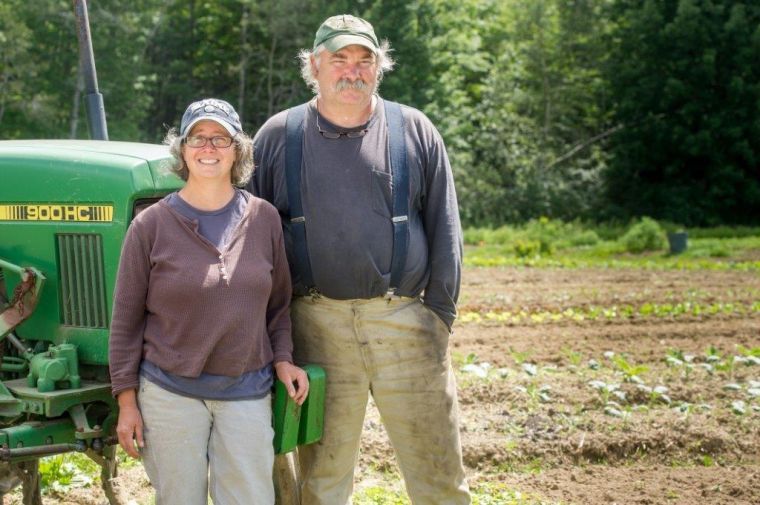I enjoyed this New York Times narrative. It’s a good story consistent with what I’ve heard from many other farmers. Those supplying restaurants had to turn on a dime. If they were not in a position to do so they were economically injured. I know that many CSAs, after a number of years of declining sales, saw a demand explode. A long-term friend of mine, maybe the best gardener in Wisconsin, added hundreds of CSA members this year, doubling that segment of his business. I haven’t asked him how his sales at the Madison Farmers Market, the largest in the country, went.
MAK
Article originally published by: nytimes.com
Ralph and Lisa Turner grow organic vegetables at Laughing Stock Farm in Freeport, Maine, supplying wholesale produce to Portland restaurants. When the governor ordered restaurants to shut down, they found themselves with eight greenhouses full of produce and 20,000 pounds of crops in cold storage — and no customers. One option they faced was destroying it all.
RALPH: In a period of about four hours on one day in March, 75 percent of our business went to zero. So our first step was to panic. That was step one.
Those sales in the springtime are revenue. For cash flow, we need the revenue from the restaurants through the spring to buy the seed, the fertilizer, the potting mix, get the labor, to get everything growing and get the fields prepped and all of that. So it wasn’t just that we couldn’t sell the product we had in the greenhouses.
LISA: You’ve already spent all the money to grow the stuff. Your money’s gone. You have spent that money. The only thing you have to do is some harvesting, washing and take it to somebody and get paid. You’ve done the hard part.
RALPH: Lisa and I are both engineers by training, and we’ve always kind of had the philosophy that bad news is good data, because once you have the data you can start to fix the problem. This was different because the news was so bad that we had no idea how to even begin to think about fixing the problem.
LISA: It was definitely like, you’re on your own here, kid. You’re not expecting that the government was going to come in with P.P.P. loans like they did. It was like, you go figure out what you are going to do. No one can fix this.
They decided to open a farm stand to sell off at least a small portion of their surplus produce. They put vegetables in plastic bags priced at $3, and put out the word to people who had subscribed to the newsletter for the farm’s C.S.A., or community supported agriculture.
LISA: We bagged up stuff as if we were going to have maybe 10 people a day come.
We sent it out to probably 450 email addresses — and then people just started sharing it and sharing it and sharing it. The first day it was like, wow, that was a lot of people. And I had to refill some stuff that I wasn’t really expecting to.
The eggs were flying out of here — we had kind of a back stock of eggs. We went through 130 dozen eggs in two and a half days. It was insane.
I called a friend who has a beef farm. And I said, we’re doing this — what’s your minimum delivery? Just bring me some stuff. She said, yeah, we can bring 40 pounds. I never got it into the freezer. I never got it priced. People were taking it out of the box and saying, how much is this? I had to look at the invoice and figure out what I was going to charge for it. It was nothing that we had imagined. It was the nuttiest thing we had ever seen.
It was so astonishing that you couldn’t process it. It really did feel like people were just coming in and throwing money at you. There were people who came in and were just like, yeah, here, keep the change. I’m going to take a $3 bag and I’m giving you a $10 bill, keep the change.
There were a gazillion people.
She compared it to the 1946 film “It’s a Wonderful Life,” in which a small-town community rallies around a struggling banker, chipping in enough money to help him pay off a loan.
LISA: It was like when they threw money at Jimmy Stewart. There were people coming in, just wanting to help. It was a lot of our customers and friends. And it was also a lot of people that we’ve never met. People like small farms, you know.
RALPH: We didn’t throw anything away. It just balanced.
They will start 2021 with a fully stocked farm store, selling their own crops, as well as meat, milk and cheese from other local farms.
LISA: It’s a nice story for a Christmas letter.
RALPH: But it’s really not where I’m at. Where I’m at is what is happening now.
You know, I’d like to say, gee, it can’t be any worse than it was this year. But, you know, it sadly, it could always be worse. So we really don’t know what’s going to happen. Like I said, head down, butt up, push forward.
LISA: But of all the Christmases I’ve lived through, this is the one that most needs to be filled with hope. There’s a lot to be thankful for. And it’s an antidote to fear.

